More youth say ‘No’ to parenthood
By Daneelia Dalrymple
Miami Lakes Educational Center/Montage
Generations Y and Z, colloquially known as Millennials and Gen Z or Zoomers respectively, may make the populations of the next Alpha and Beta generations some of the smallest, continuing a downward trend of Americans not having as many — if any — kids.
The U.S. birth rate has been steadily decreasing since the Great Recession, according to statistics from the National Center for Health Statistics. In a 2021 Pew Research Center survey, 44% of non-parents between 18 and 49 said it was unlikely that they will have children, up from 37% in 2018.

Many cite economic reasons for saying “No” to parenthood.
In a 2018 New York Times survey, 64% of adults between 20-45 claimed that they had or will have fewer kids than they want because of the high costs of childcare.
According to the National Database of Childcare Prices in a 2018 report, the U.S. Department of Labor stated that the median annual childcare costs for one child ranged from $4,810 to $15,417. With the consumer Price Index inflation calculator provided by the Bureau of Labor Statistics, this equates to a range of 5,985 to 19,183 dollars as of January 2024 for one child alone
$19,183
This could be the median annual childcare cost for one child, based on Department of Labor statistics that have been adjusted for 2024 inflation.
People are worried about being able to have a stable housing situation for their child, said Ohio State University sociology professor Sarah Hayford, who researches family formation and reproductive health.
“I think people are making those tradeoffs in their individual lives,” Hayford said, “and it is hard to know how that will balance out in the long term. Are people just going to keep waiting?”
For D’Avora Williams, who has spent a chunk of her childhood taking care of the babies of some family members, motherhood is no longer appealing. The task of caring for her young cousins was physically draining, she said.
“I really do not want to have children,” said Williams, a senior at Miami Lakes Educational Center.
Parenthood proponents, including political and religious conservatives, cite Bible verse, including Genesis 1:28: “Be fruitful and multiply” to encourage population growth.
Millennials and Gen Zers are being selfish, said Lilly Gaddis, a controversial social media influencer who supports the conservative tradwife movement. She encourages white women to embrace traditional gender roles and take a homemaking role within their marriage.
“The birth rate is declining, and what are you doing?” Gaddis posted
in June on TikTok. “Us girls getting knocked up, we are the only ones helping with the declining birth rate. You’re welcome, America.”
Declining birthrates will have a negative impact on other aspects, including the military and Social Security, government analysts say.
In a 2022 report, “The Conse- quences of Declining Fertility for Social Capital,” the United States Congress Joint Economic Committee said the consequences of declining fertility “means fewer people to serve in the military or support government programs that rely on taxpayer funding.” Similarly, non-partisan think tank Capita.org argues that
a low-birth future will affect the safety net, social programs, economy, education system, infrastructure and politics, including damage to the pay- ahead concept behind social safety net programs such as Social Security, Medicaid and Medicare.
Kathleen Castro, a Miami-Dade County high school senior, said her decision to have a child will be based on the status of human rights in America.
“If I am absolutely sure that my child will be raised in a country that protects them instead of hurting them on the basis of gender, sexuality, sexual orientation, race or ethnicity, it will certainly further convince me to have one,” Castro said.